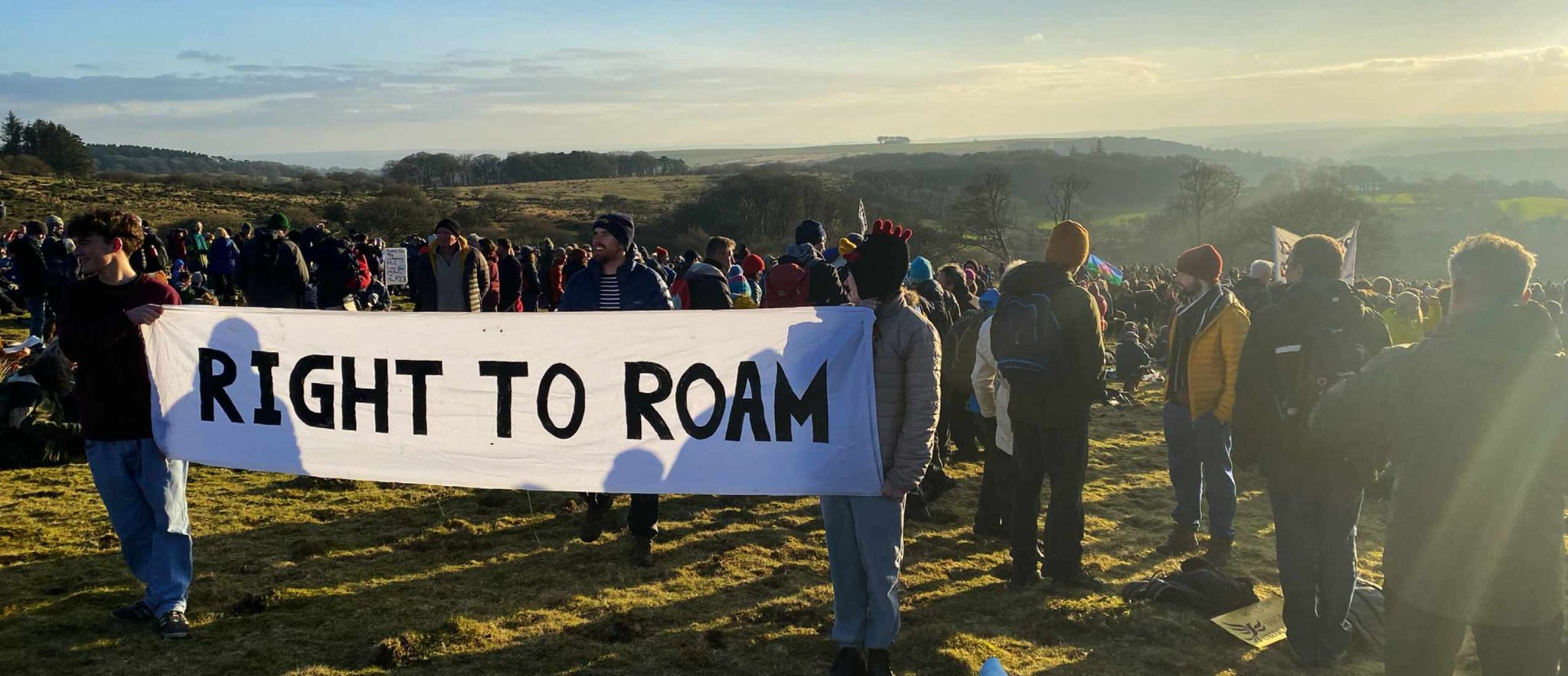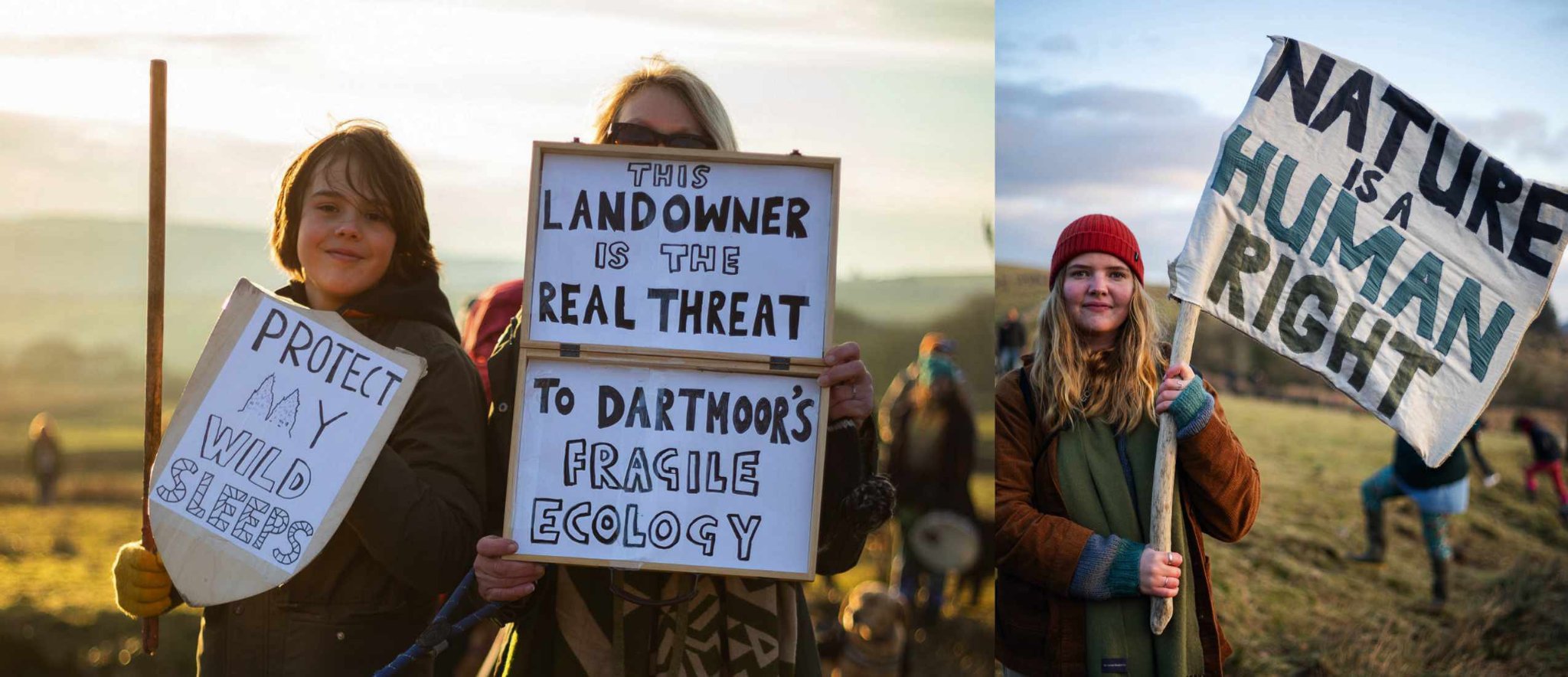BEHIND THE HEADLINES
Wild camping and land access
A recent High Court decision determined that no right to wild camp exists on Dartmoor, prompting a large protest on Stall Moor. As people clamour for greater access to nature, we investigate whether the public right to explore the countryside is being eroded
WHAT IS WILD CAMPING?
Wild camping is the act of camping overnight in remote rural areas without facilities, thus camping ‘wild’ rather than on campsites. A camper should be able to carry all their kit in a backpack, and camp responsibly by arriving late, departing early, leaving no trace.
WHAT IS THE RIGHT TO ROAM?
The right to roam is the term for the custom of wandering freely in open countryside. Public access rights vary across the UK. In Scotland, thanks to the Land Reform (Scotland) Act 2003, everyone is allowed access to most land and inland water in Scotland for certain purposes. In England and Wales, the public is entitled to enjoy some land beyond footpaths, such as mountains, moors, heaths and downs, common land registered with the council and land around the England Coast Path. This partial right to roam – opening access to about 8% of England – was granted by the-then Labour Government’s Countryside and Rights of Way Act 2000.
WHERE CAN YOU WILD CAMP?
In sparsely populated Scotland, wild camping is allowed on most unenclosed land. In England and Wales, you must gain the landowner’s permission first. Dartmoor was thought to be the only site where it was legal to wild camp freely – until this year.

WHAT WAS THE DARTMOOR HIGH COURT DECISION?
On 13 January, hedge fund manager Alexander Darwall and his wife Diana, owners of the 1,618-hectare Blachford Estate, won their case against Dartmoor National Park Authority (DNPA), which argued that the public right to access the land did not include overnight stays. DNPA had argued that the Dartmoor Commons Act 1985 – which states the public have “a right of access to the commons on foot and on horseback for the purpose of open-air recreation” – gave visitors the right to camp. The chancellor of the High Court ruled that the act contained no provision to camp overnight, and “any such camping requires the consent of the landowner”.
AFTERMATH
The High Court judgment led to a public outcry and prompted a large protest on Stall Moor on Blachford Estate in Dartmoor. Organised by campaign groups Right to Roam and The Stars Are For Everyone, the event saw 3,000 people gather to decry the decision – the largest land-rights protest in English history.
Dartmoor National Park Authority (DNPA) has since decided to appeal the court decision, and is negotiating a permissive camping agreement with the Dartmoor Commons Landowners, which includes the Darwalls, to continue to allow wild camping in certain sections of the national park.
DNPA chief executive Kevin Bishop said: “When the legislation to establish National Parks was introduced, it was described as a people’s charter – a people’s charter for the open air, for the hikers and the ramblers, for everyone who lives to get out into the open air and enjoy the countryside. The High Court judgment potentially fetters that charter and seems contrary to the wishes of Parliament.”

IMPORTANCE OF NATURE
The crucial role that nature plays in people’s health and wellbeing was felt keenly during lockdown, when people flocked to green spaces to enjoy the benefits of the outdoors. Walking – already a national pastime – became a lifeline for many, with nature proving a source of great solace. However, access to nature is not equally distributed – those living in cities on low incomes often feel alienated from the land.
RIGHT TO ROAM CAMPAIGN
Sam Lee, a spokesman for Right to Roam, said: “We have footpaths but we also have trespass laws that we have to abide by, which are extraordinarily limiting, in terms of the culture of inaccessibility, the physical inaccessibility and the fear that people have when outdoors of the consequences of stepping on private land.”
LABOUR PLEDGE
The Labour Party has said that, if elected to Government, it would introduce a right-toroam act that would allow wild camping in national parks and expand public access to woodlands and waterways.
“There are still huge parts of England and Wales that are off limits when it comes to the right to access – whether woodlands, cliffs, rivers – where the rights that we are afforded in open countryside aren’t then mirrored in those places. That needs to change,” shadow environment secretary Jim McMahon said recently.
“The event saw 3,000 people gather to decry the High Court decision – the largest land-rights protest in English history”
PROBLEMS WITH ROAMING
Those who argue against increasing public access to land point out that where people go, destruction can follow. Lockdown saw a huge increase in littering, as more people explored wild places. National parks and nature reserves reported increased disturbance of wildlife and habitat destruction as a result of higher footfall and antisocial behaviour, while some farmers complained of walkers disturbing livestock.
The Darwalls say their concern for Dartmoor led them to challenge camping entitlement. “Dartmoor is increasingly under pressure from fly campers, litter, raves and so on – a small number of people who spoil it for everyone. We want to keep Dartmoor unspoilt with the principle of leave no trace… Blachford Estate believes the permissive agreement preserves and facilitates the spirit and ethos of genuine ‘backpack’ camping.”
FARMERS’ VIEW
The National Farmers Union argues that the public has considerable access to nature already in the form of an extensive footpath network.
NFU environment forum chair Richard Bramley said: “The great British countryside is more accessible than ever before, with more than 200,000km of footpaths, bridleways and greenways. This allows the public to value and appreciate farmed landscapes, helps with wellbeing and connects people with rural areas that they may never have visited before.
“Many popular rural tourist spots are working farmland, where farmers are producing food and working hard to maintain footpaths and public rights of way… We encourage everyone to observe the Countryside Code and not to cross over into damaging private property, food crops or disturbing livestock.”